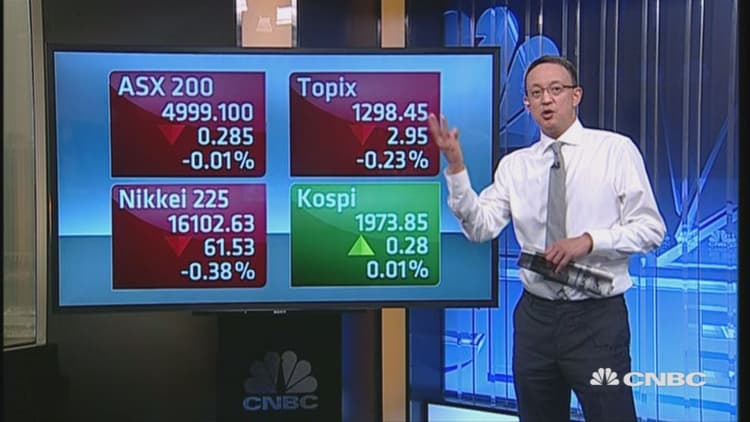
Asian markets were mixed Monday, not getting much of a boost from the better-than-expected U.S. jobs data last week, while Japanese shares lost ground on the back of a stronger yen.
Japan's gave up early gains to finish down 40.89 points, or 0.25 percent, at 16,123.27. The Kospi in South Korea closed up 5.4 points, or 0.27 percent, at 1,978.97.
Australia's ASX 200 closed nearly flat at 4,995.30, with the financials sub-index reversing most of its early gains of nearly 1 percent to close up 0.19 percent. The country's so-called Big Four banks - ANZ, Commonwealth Bank of Australia, Westpac and NAB - finished mixed, between down 0.1 percent and up 0.55 percent.
Markets in China, Hong Kong and Taiwan are closed today.
In Japan, data from Bank of Japan (BOJ) showed that its decision to adopt negative interest rates in late January has not convinced Japanese companies that inflation in the country will take off.
Additional data released on Monday as part of the BOJ's Tankan survey for March showed that companies expected prices to increase on average 0.8 percent a year from now, lower than their previous expectations of a 1 percent increase earlier this year. Firms expect prices to go up 1.1 percent over three years, lower than their previous expectations of a 1.3 percent rise. The Tankan survey was originally released on Friday.
The yen, which has strengthened since the BOJ's decision to introduce negative rates in late January, was at the 111 handle against the dollar on Monday; as of 2:41 p.m. HK/SIN, the dollar/yen pair traded at 111.42.
Major Japanese exporters were lower, with shares of Toyota closing down 2.53 percent, Nissan off 2.78 percent and Honda lower by 1.1 percent. A stronger yen is a negative for exporters as it affects their overseas profits when converted into local currency.
Stephen Innes, a senior FX trader at OANDA, said in a note the pair's decline was due to the "haven appeal for dollar weakness" and had little to do with yen strength. The U.S. dollar has lost ground as U.S. Federal Reserve Chair Janet Yellen last week made dovish comments that eased concerns that interest rates might be raised at the central bank's April meeting.
On Friday, figures showed that U.S. nonfarm payrolls increased by 215,000 in March, beating expectations for 205,000 jobs. The U.S. unemployment rate was at 5.0 percent, the first month-over-month increase since May 2015.
"This month's job data, together with strong job growth over the last few months, will help to maintain investors' confidence in the U.S. economy and reduce worries of a recession," Margaret Yang, market analyst at CMC Markets Singapore, said in a note Monday.
But she noted that the jobs data isn't likely to impact market expectations that the U.S. Federal Reserve will increase interest rates twice this year.
U.S. crude futures retreated during Asian hours, down 1.44 percent at $36.26 a barrel as of 3:41 p.m. HK/SIN, after finishing down 4 percent on Friday. Global benchmark Brent futures were off 1.14 percent at $38.23 a barrel, after finishing down 2.34 percent on Friday.
Oil prices took a hit from Saudi Arabia's deputy Crown Prince Mohammed bin Salman's remarks last week that cast fresh doubts over the ability of world oil producers to agree to an output freeze at their meeting in Qatar on April 17. The prince was reported as saying the kingdom would not participate in a freeze if Iran and other major producers, both OPEC and non-OPEC, do not join the program.
Evan Lucas, market strategist at IG, said in a morning note, "There has not been one proposal yet that Iran has remotely entertained." He added that Iran was still producing 25 to 30 percent below its pre-sanctions levels. "[That is] the level Iran want to reach before entertaining any form of 'freeze,'" he noted.
Iran's Minister of Petroleum, Bijan Zanganeh, said over the weekend that the country is exporting above 2 million barrels of oil and gas condensates a day, according to the Shana news agency.
Energy plays in Asia were mostly lower on Monday, with shares of Santos finishing down 4.34 percent and Woodside Petroleum down 2.69 percent, while Inpex erased gains to finish 0.5 percent lower. Japan's Fuji Oil added 2 percent.
Major U.S. indexes closed higher on Friday, with the up 0.61 percent, the S&P 500 higher by 0.63 percent and the ending up 0.92 percent.
— Patti Domm contributed to this report.



